We may not have the course you’re looking for. If you enquire or give us a call on +852 2592 5349 and speak to our training experts, we may still be able to help with your training requirements.
We ensure quality, budget-alignment, and timely delivery by our expert instructors.
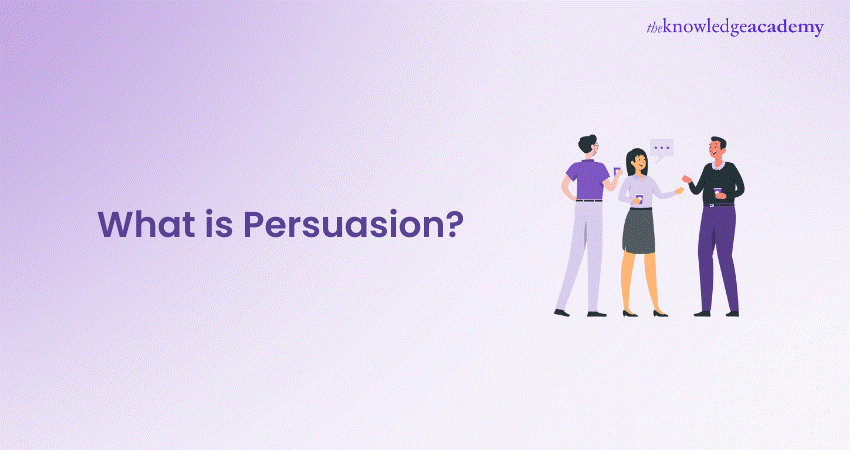
Have you ever wondered how one individual can convince others while others are unable to achieve so? Is there a secret code to perform such a compelling act? The remedy lies in the psychological strategies that work under the radar. We have ascertained you must have figured it out from the title. Persuasion is such a profound topic for a complete library to fill in.
It has a substantial influence on the persuadee. A study by Kellogg Insights says that participants' impressions of a product rose from an average rating of 4 to nearly 7 when weak facts were embedded in a perusable story.
In this comprehensive blog, you will delve into What is Persuasion, its fundamental types, key advantages, real-world examples, and plenty more. Let’s immerse ourselves in this riveting persuasion analysis.
Table of Contents
1) What is Persuasion?
2) Persuasion Types
3) Persuasion Principles
4) Persuasive Speech Components
5) Persuasive Real-world Examples
6) Conclusion
What is Persuasion?
Persuasion is a science of convincing others to perform a specific action. These include purchasing a product/service or doing something deliberately. There is an abundance of ways where individuals persuade others and create a psychological impact on them.
The strategies to perform such an operation are so vast that it could go beyond filling the entire library. A lot of studies have been conducted to analyse the impact of persuasion techniques. Interestingly, it proved to be equally effective, with success rates ranging between 50-85% depending on the method used.
Persuasion Types
If we divide those lists of persuasion strategies into parts, it could come out to be Ethos (ethics), Pathos (emotions), and Logos (logic). These three terms were derived from Latin: meaning, credibility, emotion, and ability to reason. Let’s now understand these two terms in detail:
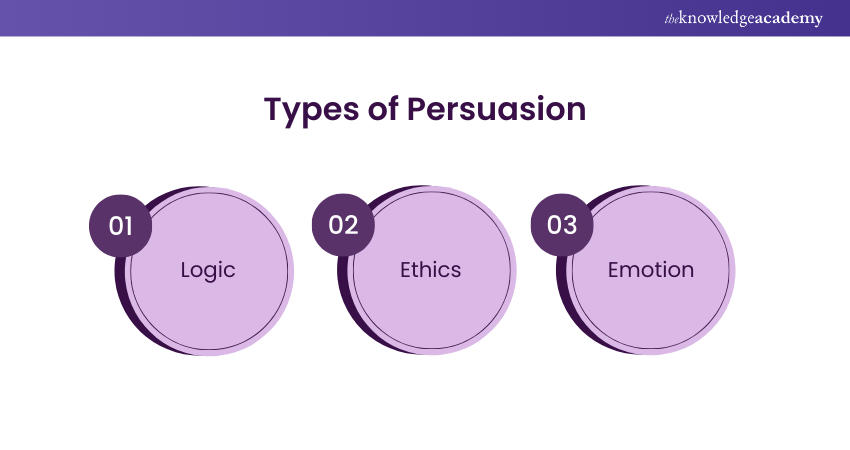
1) Logic
Logic, also known as “Logos,” is the art of using scientific evidence and data-driven facts to convince others. It is the surefire way to instill trust in others logically (hence the name). To understand it better, let’s take toothpaste as an example.
If we used the Logic technique, we would advertise by saying that it contains Fluoride, which prevents tooth decay and strengthens enamel (scientific evidence highlighted here).
2) Ethics
Ethics, the English name for ‘Ethos’ deals majorly with convincing and deliver your impact through credibility and authenticity about the particular brand or product. Unlike Logic, it does not work through scientific evidence but by telling the pursuadee about the number of people who have used it.
For instance, considering the same example- to advertise toothpaste, we would say that it is recommended by thousands of dentists worldwide. Else, we can list the reviews of the people who have used this product to convince the target audience.
3) Emotion
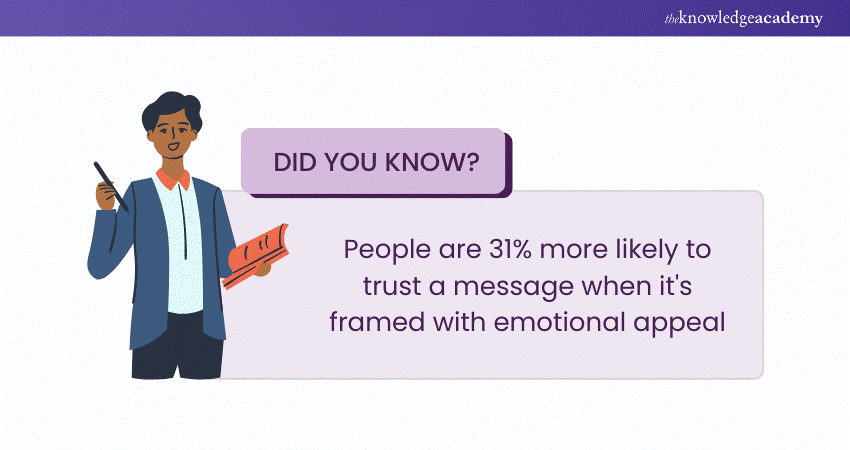
Emotions or ‘Ethos’ is another way of delivering influence on the target audience. It is a technique that is less dependent on scientific-based and more on emotional stances. This persuasion technique can work well for the audiences who value personal stories and human experiences over pure logic and data-driven arguments.
Let’s take the same example to understand this. To advertise the toothpaste, the advertiser would say, “This toothpaste is made with the goodness trusted by families across the country.”
Listen better to succeed faster with our Active Listening Training – sign up today!
Persuasion Principles
There are multiple ways of persuading audiences. The listed above were the types. This time, we shall discuss the fundamental principles behind persuasion. Here are the listed methods:
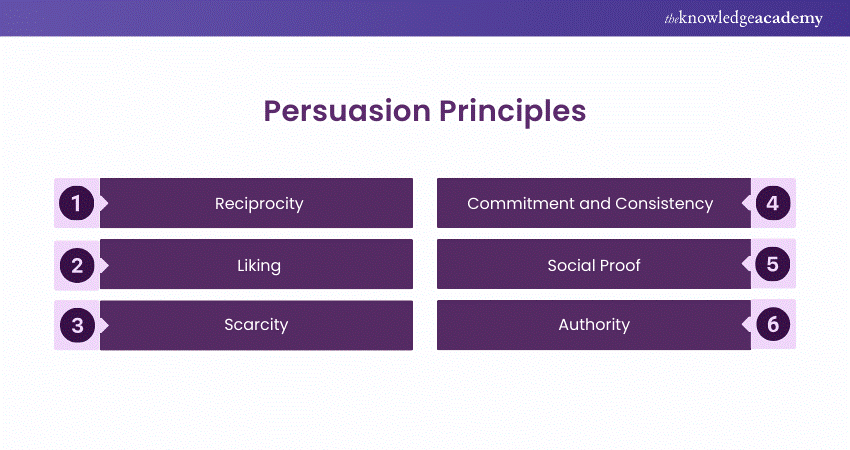
1) Reciprocity
Reciprocity deals with convincing customers to return the favour in an indirect manner. Many top brands have successfully utilised these techniques to sell their products and deliver profitability. For instance, a toothpaste brand sends free samples to potential customers. The individual who has received this sample will be pleased with the company’s gesture. As a result, they will purchase that product.
2) Liking
As mentioned earlier, persuasion is a psychological technique. Based on the recent study, likability for persuader can increase effectiveness of persuasion by 30% to 40%. This fact is applicable to your favourite celebrity or influential personality you idolise and is promoting that product. The reason behind the audience feels deeply connected with them.
For instance, the same toothpaste if promoted by celebrities like Warren Buffet or Sylvester Stallone could result in more purchasing and profitability.
3) Scarcity
Scarcity is a way of creating urgency among the targeted customers. This a more of a psychological aspect where customers, after learning that the promoted product has a limited supply, are more likely to purchase it.
Taking toothpaste as an example, the brand might introduce the product as a ‘Limited Offer’ or ‘Limited Availability.’
4) Commitment and Consistency
Commitment and consistency, also a key principle in psychology, says that once individuals commit to their decision or behaviour, they are more likely to follow through to adhere to that commitment.
For example, when toothpaste brands introduce a 30-day challenge, participants who engage in this challenge are more likely to continue using the product beyond the initial period. This is because they have made a public or personal commitment, and the desire to remain consistent with that commitment drives them to stick with the product.
5) Social Proof
Individuals are most likely to use products that are used by other people in society. This applies to everyone, irrespective of the group or ethnicity they are from.
For instance, if someone learns that the same toothpaste is used by their neighbours, friends, or family members, they will most probably purchase that toothpaste. Such principles are commonly implemented by brands worldwide (refer to the ‘Ethics’ section) by highlighting the customers’ testimonials on their product descriptions.
6) Authority
Authority principles include delivering authenticity in terms of their products. Such techniques utilise the recommendation of credible persons in this domain, such as a professional who designs and engineers a particular product.
For instance, toothpaste brands might endorse a dentist to recommend that product to the public.
Persuasive Speech Components
Persuasive speech is a powerful tool used by the persuaders to influence their targeted audience. It requires careful consideration of the set of both the content and the delivery. To be able to remain effective, the speech must engage the listeners, appeal to their emotions, and present logical arguments that resonate with their values. Here are the crucial components of persuasive speech.
1) Establishing Credibility
Credibility is about convincing your audience about your trustworthiness and knowledge on the specific product or topic. For this, the speaker needs to demonstrate expertise, provide evidence, and speak confidently. When people believe the speaker knows the topic very well, they are more likely to be persuaded by the message the speaker gives.
For instance, a dentist starting their speech on dental health will first mention their qualifications and experience to gain the trust of the audience.
2) Knowing Your Audience
Understanding your audience’s needs, interests, and values is key to crafting a persuasive speech. When you tailor your message to address their concerns and speak in a way that resonates with them, your chances of persuading them increase significantly.
For example, if you are talking to parents about children's toothpaste, you would focus on safety and health benefits, which align with their concerns for their children’s well-being.
3) Effective Communication
Effective communication involves using clear language, proper tone, and engaging delivery to ensure the message is understood and well-received. This includes using appropriate body language, voice modulation, and visual aids to to retain the audience's interest and reinforce your points.
For example, a speaker discussing the benefits of eco-friendly toothpaste might use vivid visuals showing environmental impact, maintaining eye contact, and varying tones to keep the audience engaged.
Build career-ready EQ skills with our Emotional Intelligence Training- register now!
Persuasion Real-World Examples
Persuasion plays a crucial role in shaping behaviour of the persuadee and empowering decisions across diverse sets of domains. From encouraging people to adopt healthier lifestyles to increasing consumer loyalty, persuasion techniques have profound impacts when used effectively. Here are real-world examples of persuasion.
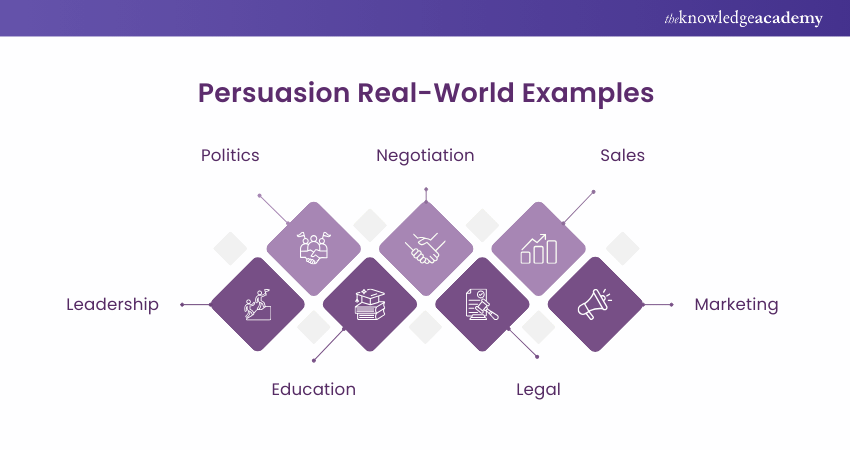
1) Leadership
In leadership, persuasion is used to inspire and motivate teams. A good leader uses persuasive techniques like establishing credibility (ethos), presenting logical plans (logos), and appealing to team values or emotions (pathos).
For example, a CEO convincing employee to adopt a new strategy would emphasise the long-term benefits (logic), share a personal commitment to the plan (credibility), and appeal to the shared goal of company success (emotion).
2) Politics
Politicians often use persuasion to gain public support for policies or campaigns. They establish credibility by highlighting their experience, using facts and statistics to present logical arguments, and tapping into voters' emotions by addressing concerns such as safety, economy, or national pride.
For instance, a candidate may use emotional appeals when discussing healthcare reforms and showing personal stories of families in need.
3) Education
In education, teachers and educators persuade students to engage with learning. A teacher may persuade students to study harder by showing how education leads to better future opportunities (logic), sharing personal experiences or success stories (credibility), and creating an inspiring classroom environment (emotion). This combination encourages students to stay motivated.
4) Negotiation
In negotiations, persuasion is about achieving a win-win solution. A negotiator might use logical reasoning to show the advantages of an agreement, establish credibility through expertise, and appeal to the other party’s needs or emotions to reach a final compromise. For instance, in business negotiations, showing how both parties will profit ensures buy-in from all sides.
5) Legal
Lawyers use persuasion in legal cases by presenting evidence logically (logos), building trust through their legal expertise (ethos), and appealing to the emotions of the jury or judge (pathos). A lawyer defending a client may use logical arguments backed by evidence while also tapping into the jury’s sense of justice or empathy for the client.
6) Sales
In sales, persuasion is key to converting leads into customers. A salesperson persuades by showing the logical benefits of a product (e.g., saving money), building credibility by demonstrating expertise or brand trust, and tapping into emotions like excitement, fear of missing out (scarcity), or desire for improvement.
For example, a car salesman might emphasise fuel efficiency (logic), their years of experience (credibility), and the joy of driving a new car (emotion).
7) Marketing
Marketing campaigns heavily rely on persuasion to influence consumer behaviour. Brands utilise logical appeals by showing product benefits, building trust through brand reputation or testimonials (ethos), and tapping into emotions like happiness, nostalgia, or fear.
For example, a toothpaste brand may use social proof by showing endorsements from dentists (ethos) while also highlighting the health benefits of using their product (logos) and appealing to the consumer’s desire for a bright, confident smile (pathos).
Enhance negotiations in high-stakes meetings- sign up for our Managing Difficult Conversations Training!
Conclusion
We hope you understand What is Persuasion and the related insights. Persuasion is an all-inclusive topic that requires a separate course. Even though it is evident that persuasion is both science and art. Science in the way that it is grounded in psychological principles and research, and art because it requires creativity, intuition, and emotional intelligence. All in all, it has the potential to influence others and make a significant difference for the candidates in the corporate ecosystem.
Maximise business outcomes with our Strategic Planning and Thinking Course- join today!
Frequently Asked Questions

The main goal of persuasion is to influence someone's thoughts, beliefs, or actions in a way that aligns with their desired outcome. It provides an ability for the individual to convince the audience to adopt a specific point of view or take a particular action using the techniques of logic, credibility, and emotion.

Persuasion plays a critical role in communication by shaping opinions, decisions, and behaviour. It helps individuals or businesses present compelling arguments, build trust, and appeal to emotions, driving action in leadership, marketing, politics, and more.

The Knowledge Academy takes global learning to new heights, offering over 30,000 online courses across 490+ locations in 220 countries. This expansive reach ensures accessibility and convenience for learners worldwide.
Alongside our diverse Online Course Catalogue, encompassing 19 major categories, we go the extra mile by providing a plethora of free educational Online Resources like News updates, Blogs, videos, webinars, and interview questions. Tailoring learning experiences further, professionals can maximise value with customisable Course Bundles of TKA.

The Knowledge Academy’s Knowledge Pass, a prepaid voucher, adds another layer of flexibility, allowing course bookings over a 12-month period. Join us on a journey where education knows no bounds.

The Knowledge Academy offers various Personal Development Courses, including Persuasion Training, Active Listening Course, and Emotional Intelligence Training. These courses cater to different skill levels, providing comprehensive insights into Prosocial Behaviour.
Our Business Skills Blogs cover a range of topics related to professional development, offering valuable resources, best practices, and industry insights. Whether you are a beginner or looking to advance your business management skills, The Knowledge Academy's diverse courses and informative blogs have got you covered.
Upcoming Business Skills Resources Batches & Dates
Date
 Persuasion Training
Persuasion Training
Fri 24th Jan 2025
Fri 21st Mar 2025
Fri 2nd May 2025
Fri 29th Aug 2025
Fri 3rd Oct 2025
Fri 5th Dec 2025







 Top Rated Course
Top Rated Course



 If you wish to make any changes to your course, please
If you wish to make any changes to your course, please


